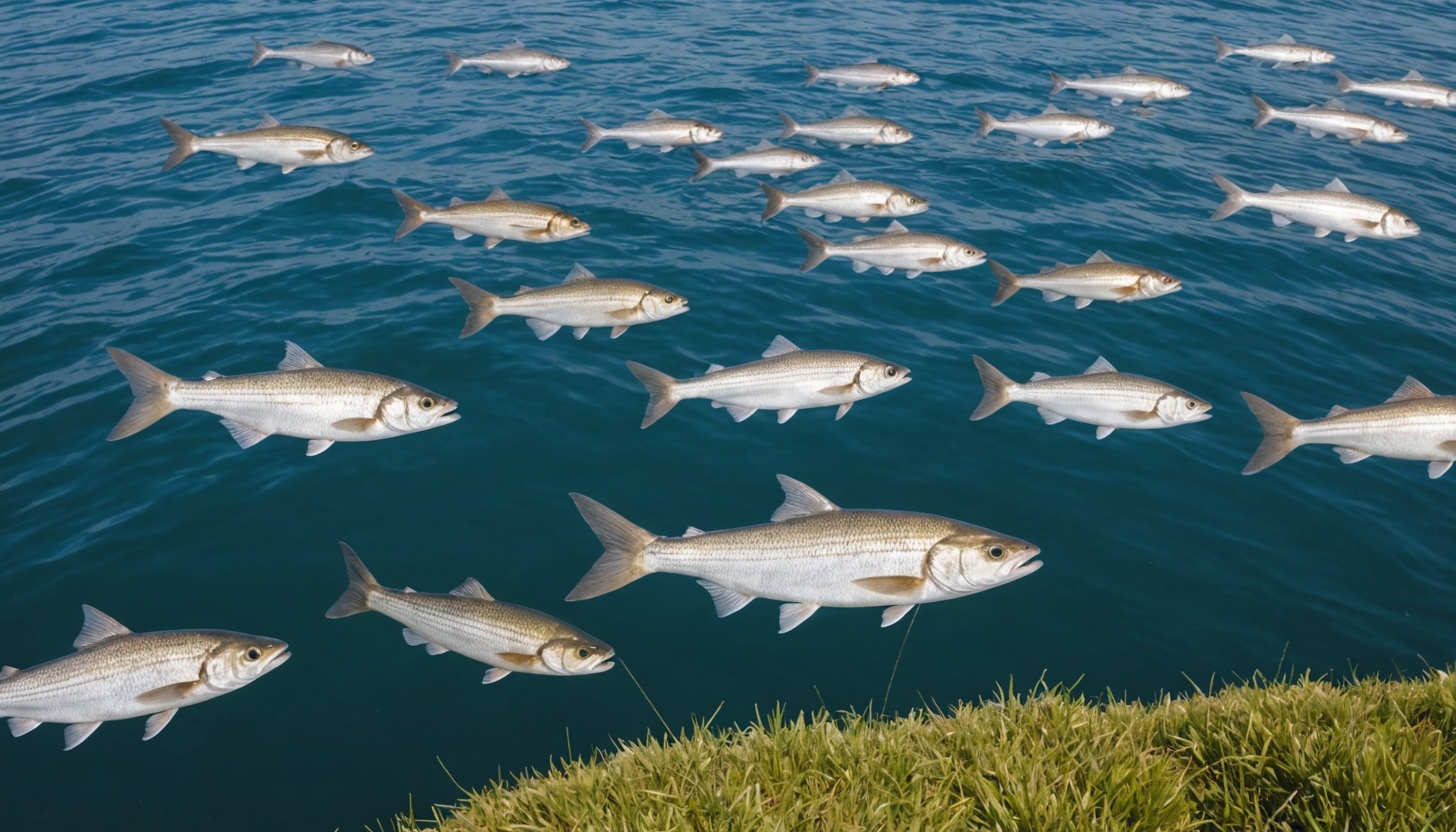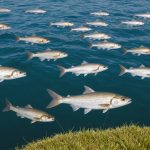Top UK Angling Techniques to Safeguard Fish and Champion Sustainable Fishing
In the UK, the fishing industry is at a crossroads, facing challenges such as overfishing, pollution, and the need for sustainable practices. As anglers and consumers, we have a crucial role to play in ensuring that our fishing methods are not only enjoyable but also environmentally friendly. Here, we delve into the top UK angling techniques that are paving the way for sustainable fishing, protecting fish populations, and preserving the marine environment.
The Rise of Sustainable Fishing Practices
Sustainable fishing practices are no longer just a niche interest; they are becoming the norm. One of the most innovative methods gaining traction is the ‘Disco Scallop’ technique. This method, developed by Fishtek Marine and supported by Natural England, uses crab pots illuminated with LED lights to attract scallops. This approach significantly reduces the damage to seabeds compared to traditional dredging methods, which can be devastating to marine habitats[1][5].
In parallel : Revamping UK Pesticide Regulations: Innovative Strategies to Protect Pollinators
### Key Benefits of the 'Disco Scallop' Method
- **Low Impact**: Minimizes damage to seabeds, preserving marine habitats.
- **Commercial Viability**: Provides a premium product that can command higher prices.
- **Diversification**: Allows fishermen to diversify their catch, securing new income streams.
- **Environmental Awareness**: Promotes awareness and adoption of sustainable fishing practices among consumers.
Reducing Anglers’ Pollution and Environmental Impact
Anglers, whether recreational or commercial, have a significant impact on the environment. However, by adopting best practices, we can minimize this impact.
Catch and Release Fishing
Catch and release fishing is a popular method among anglers that helps conserve fish populations. Here are some tips to make it more effective:
In the same genre : Boosting uk farming: eco-friendly strategies to safeguard barn owl populations
### Best Practices for Catch and Release Fishing
- **Use the Right Gear**: Choose hooks and lines that minimize injury to the fish.
- **Handle Fish Carefully**: Avoid touching the fish excessively and keep them out of the water for as short a time as possible.
- **Release Quickly**: Release the fish as soon as possible to reduce stress and prevent injury.
- **Avoid Overfishing**: Follow local regulations and avoid overfishing to ensure sustainable fish stocks.
Eco-Friendly Tackle
The tackle we use can also have an environmental impact. Here are some eco-friendly alternatives:
### Eco-Friendly Tackle Options
- **Biodegradable Lines**: Opt for biodegradable fishing lines that break down naturally.
- **Lead-Free Weights**: Use lead-free weights to prevent lead pollution in water bodies.
- **Recycled Hooks**: Choose hooks made from recycled materials.
- **Non-Toxic Lures**: Select lures that are free from toxic materials.
Supporting Sustainable Fisheries
Sustainable fisheries are crucial for the long-term health of our oceans and the fishing industry. Here’s how you can support them:
Choosing Sustainable Seafood
When purchasing seafood, look for the Marine Stewardship Council (MSC) ecolabel, which recognizes and rewards sustainable fishing practices. In 2023/24, spending on MSC-certified seafood in the UK and Ireland reached a record £1.5 billion, a 12% increase from the previous year[2].
### Why Choose MSC-Certified Seafood?
- **Sustainable Fishing**: Ensures that the seafood comes from fisheries that meet rigorous sustainability standards.
- **High Quality**: MSC-certified seafood is often of higher quality and freshness.
- **Consumer Awareness**: Supports consumer awareness and demand for sustainable seafood.
- **Market Impact**: Drives market demand for sustainable fishing practices.
Community-Led Initiatives
Community-led initiatives are vital in promoting sustainable fishing practices. For example, the Scottish Creel Fishermen’s Federation, in collaboration with The Scottish Entanglement Alliance, has developed a low-cost solution to reduce cetacean mortality in creel fishing gear. Such initiatives demonstrate the power of partnership between fishers, scientists, and government[3].
Protecting Marine Protected Areas (MPAs)
Marine Protected Areas (MPAs) are essential for conserving marine biodiversity and protecting fish populations. However, these areas are often under threat from destructive fishing practices.
The Importance of MPAs
- Biodiversity Conservation: MPAs help conserve marine species and habitats.
- Fish Stock Recovery: Protected areas allow fish stocks to recover and replenish.
- Ecosystem Health: MPAs maintain the health of marine ecosystems, which is crucial for climate resilience.
Current Challenges and Solutions
Despite their importance, MPAs in the UK are still vulnerable to destructive bottom-towed fishing. For instance, over 90% of the nation’s MPAs are subject to such practices. Efforts by organizations like the North Sea Wildlife Trusts and the Northern Ireland Marine Task Force are working to protect these areas and advocate for policy changes to support more sustainable fishing practices[3].
Addressing Climate Change and Its Impact on Fisheries
Climate change poses significant challenges to fisheries, affecting water quality, fish distributions, and the overall health of marine ecosystems.
Climate-Resilient Fisheries
To build climate-resilient fisheries, it is essential to adopt practices that mitigate the impacts of climate change. Here are some strategies:
### Strategies for Climate-Resilient Fisheries
- **Diversification of Catch**: Encourage fishermen to diversify their catch to reduce dependence on single species.
- **Adaptive Management**: Implement adaptive management practices that respond to changing environmental conditions.
- **Regenerative Aquaculture**: Support regenerative aquaculture practices that improve water quality and biodiversity.
- **Research and Monitoring**: Continuously monitor and research the impacts of climate change on fisheries to inform policy and practice.
Community-Driven Conservation Efforts
Community-driven conservation efforts are crucial for the success of sustainable fishing initiatives.
Fisher-Led Initiatives
Fisher-led initiatives, such as the Plymouth Fishing and Seafood Association, are examples of community-driven approaches to fisheries management. These initiatives bring fishers together to drive regional approaches to sustainable fishing practices and ensure that the voices of small-scale, low-impact fishers are heard[3].
Angling Trust and Community Engagement
The Angling Trust, a leading organization for anglers in the UK, plays a significant role in promoting sustainable angling practices and engaging communities in conservation efforts. Through events, workshops, and advocacy, the Angling Trust helps raise awareness about the importance of sustainable fishing and supports initiatives that protect fish populations and the marine environment.
Practical Insights and Actionable Advice
For those looking to make a positive impact, here are some practical insights and actionable advice:
Get Involved in Local Fishing Events
Participate in local fishing events and workshops to learn more about sustainable fishing practices and how you can contribute to conservation efforts.
Support Sustainable Fisheries
When purchasing seafood, choose products that are certified by organizations like the MSC. This supports sustainable fisheries and encourages more fishers to adopt environmentally friendly practices.
Adopt Eco-Friendly Angling Practices
Use eco-friendly tackle, practice catch and release fishing responsibly, and support community-led conservation initiatives.
Sustainable fishing is not just a necessity; it is a collective responsibility. By adopting innovative techniques like the ‘Disco Scallop’ method, reducing anglers’ pollution, supporting sustainable fisheries, protecting MPAs, addressing climate change, and engaging in community-driven conservation efforts, we can ensure a healthier marine environment and sustainable fish stocks for future generations.
As Dr. Rob Enever from Fishtek Marine aptly puts it, “With rising fuel costs, post-Brexit regulatory changes, reduced catch and unstable prices the fishing industry is under strain. We are also exploring new opportunities for catching scallops within offshore wind developments where dredging is restricted. For UK fishermen, pot caught Disco Scallops provide a vital opportunity to adapt and secure livelihoods, especially to diversify beyond crab and lobster fisheries that have faced increasing challenges in recent years.”[5]
By working together and embracing sustainable fishing practices, we can make a significant impact on the health of our oceans and the future of the fishing industry.
Table: Comparison of Traditional Dredging vs. ‘Disco Scallop’ Method
| Aspect | Traditional Dredging | ‘Disco Scallop’ Method |
|---|---|---|
| Environmental Impact | Damages seabeds, destroys habitats, and causes bycatch. | Minimizes damage to seabeds, reduces bycatch. |
| Catch Quality | Often results in lower quality scallops due to damage during the dredging process. | Produces high-quality, undamaged scallops. |
| Commercial Viability | Can be cost-effective but faces increasing regulatory scrutiny. | Offers a premium product, commanding higher prices. |
| Fisherman Benefits | Limited opportunities for diversification. | Allows fishermen to diversify their catch, securing new income streams. |
| Consumer Awareness | Less awareness among consumers about the environmental impact. | Promotes awareness and adoption of sustainable fishing practices among consumers. |
Quotes from Key Figures
- Mark Duffy, Marine Principal Adviser, Natural England: “Embracing adaptation, innovation and working strategically with partners in seeking solutions that tackle the causes of pressures, rather than the symptoms, is one of our key marine Nature Recovery Principles.”[1]
- Rachel Walker, Communications Consultant and Member of The Disco Scallop Collective: “By putting modified pots in the water, fishermen are being given a chance to diversify their catch and secure new income streams, while consumers gain access to a sustainable, seabed-safe scallops they can enjoy guilt-free.”[5]
- Dr. Rob Enever, Fishtek Marine: “We are incredibly excited about this brilliant innovation which offers a sustainable alternative to dredged scallops and also supports UK fishermen by helping them diversify.”[5]











